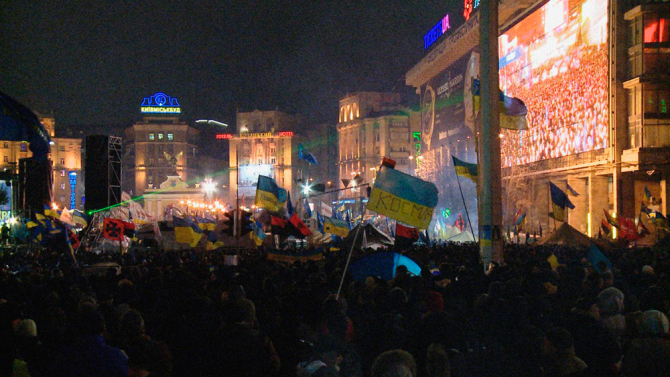MAREK MAJ previews Sergei Loznitsa’s Maidan – a ‘thrilling, incendiary piece of cinema’ – courtesy of DocHouse.
Highly regarded Ukrainian filmmaker Sergei Loznitsa returns to the documentary format after his first two feature films – My Joy (2010) and In The Fog (2012) – brought him international acclaim. Maidan, which screened at the Cannes, Toronto and London film festivals, is a rigorous, clear-eyed study of the anti-government, pro-European street protests that took place in Kiev’s central square last winter and resulted in the ousting of president Viktor Yanukovych.
Loznitsa had said that “unlike most documentaries, Maidan has a style” and it is immediately clear what he means. With great formal audaciousness the film eschews the use of familiar docu-tropes such as voiceover, talking heads or shaky cam, instead capturing the action in long, static master shots with occasional intertitles to provide some context. Many critics have remarked upon how this insistence on portraying ‘the crowd’ itself as the key protagonist is reminiscent of Eisenstein’s early silent works. Aesthetically, the film bears more resemblance to Bruegel’s Census at Bethlehem or a photo from the time of the Paris Commune, but with the production design of Alfonso Cuarón’s Children of Men. Credit must go to Loznitsa and his camera operators (Serhiy Stefan Stetsenko and Mykhailo Yelchev) for having enough composure to not only capture the unfolding events, but in such a visually engaging way. Comparisons with Eisenstein are in fact completely superficial – Maidan resolutely presents the facts, not propaganda.
The film begins with real chutzpah: a ‘cold open’ shot of a huddled mass of protesters, standing in the freezing cold, belting out the national anthem. What is striking is just how diverse the crowds are; the elderly, the young, men, women and even some children all stand together. Over the next two hours we will see the citizens of Kiev attend speeches, rallies and poetry recitals; build campsites, clinics, kitchens, and barricades; light flares and fireworks, throw cobblestones ripped from the streets, and face the barrels of police guns. Loznitsa is right to let the images speak for themselves, for what they show is quite extraordinary: ordinary people, compelled to take mass political action and willing to put their lives on the line, in order to reassert their nation’s right to self-determination.
Maidan is both a thrilling, incendiary piece of cinema and an important historical document, unflinchingly chronicling the chaotic prelude to a conflict that is still ongoing and may yet come to change the future of Europe forever.
There will be a DocHouse screening of the film on Wednesday 26th November, 2014 at 8:20pm at the Institute of Contemporary Arts, The Mall, London, SW1Y 5AH. This will be followed by a discussion with Raisa Sidenova (doctoral candidate in Film and Media Studies at Yale University and a visiting researcher at the School of Slavonic and East European Studies, UCL) and Joanna Szostek (postdoctoral research fellow at the School of Slavonic and East European Studies, UCL). Details can be found HERE.





